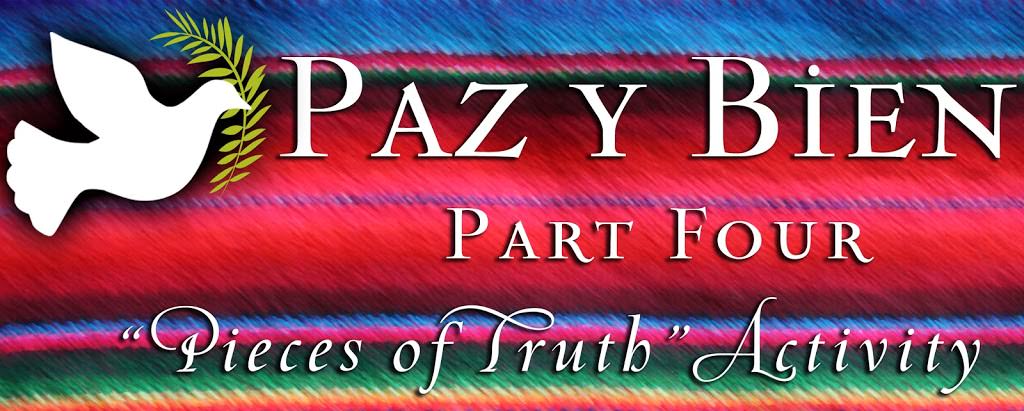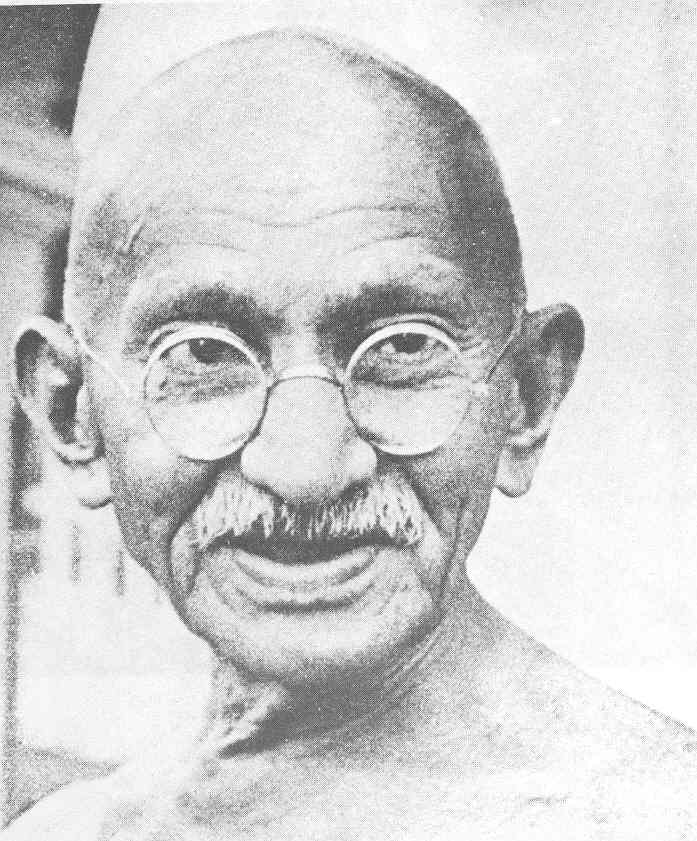Paz y Bien: “Pieces of the Truth” activity

Lay missioner Annemarie Barrett continues her non-violence series by sharing an activity inspired by Mohandas Gandhi that she has done with groups in Bolivia.
“Gandhi’s nonviolence maintains that no one possesses the entire truth. Rather, each of us possesses a piece of the truth and the un-truth. In a conflict, nonviolent action seeks to reveal the pieces of the truth of both parties so that solutions can be constructed that incorporate them (Engage, page 72).”
One of my favorite activities, or dinamicas as they are called here, that we offer in the nonviolence workshops is called “Pieces of the Truth” and comes from the Engage study program.
Before beginning this dinamica, we start the session by reading the nonviolence principles of Mohandas Gandhi. One of these principles says, “We each have a piece of the truth and the un-truth.”
We read these principles aloud together and then take a moment to let them sink in. In silence we might repeat them to ourselves, we might sit with one in particular, we might recall some experience related to the principles. Then we each share a word on our hearts in response to this brief reflection.
 |
| Mohandas Gandhi (public domain) |
“Amor.” (love)
“Esperanza.” (hope)
“Comunidad.” (community)
“Entendimiento.” (understanding)
“Fe.” (faith)
And after discussing a bit more about the life of Gandhi, we begin the “Pieces of the Truth” dinamica.
We start by picking an issue that is of interest in the group. In one group we focused on domestic violence and in another group we focused on homelessness. We then chose roles related to the issue.
For example, in relation to the issue of homelessness we imagined people who might be affected daily by this reality, a person who is experiencing homelessness and a storeowner who often finds people who are homeless sitting or sleeping in front of their store.
In our workshop with the Franciscan friars in formation here in Cochabamba, the issue of homelessness is one that they encounter daily living downtown where many families sleep on the streets each night.
After identifying these roles, we asked the friars to form small groups where they would each personally assume one of these roles.
They were each invited to close their eyes and stand in silence as they contemplated the role they’d been given. As a person experiencing homelessness, what is it like to be me? As a storeowner, what is it like to be me?
The moment in silence is an invitation for them to get in touch with the piece of the truth that their new role holds. As a person experiencing homeless, what do they have to share about their experience that the storeowner might not know or understand?
They are then invited to share that piece of the truth with the rest of their small group. They speak for at least 30 seconds from the perspective of the person they are role-playing and then in turn they listen to the perspectives of the other roles.
And then we enter my favorite part of this dinamica, after having entered into the truth of that person’s experience and speaking that truth to their group, the friars were asked to change roles.
The friar who was roleplaying the storeowner just moments ago, speaking about their need to maintain their business and complaining about the person begging for money in front of their store, was then invited to speak as the person begging for money.
They were invited to ask the same questions of themselves, but in this new role. What is it like to be me? What are my motivations? My experiences? What is my truth?
After having each spoken from the perspective of each role, we reflected on the experience. One of the friars shared what it was like to speak the truth of the person experiencing homelessness. He shared that we often lack this perspective or understanding and especially as Franciscans, we are called to become more in tuned with the reality of these people who are marginalized.
In one of the Christian Base Communities where we also shared this dinamica, one of the women shared how the experience of roleplaying helped her become more in touch with her own voice. She explained that in meetings with other parents at her childrens’ school she often does not raise her voice and share, but in this dinamica she had to speak and from a variety of perspectives. For her, the experience empowered her to use her own voice and consider speaking her own truth.
The variety of reactions and reflections that come from this dinamica are influenced in many ways by the particular context that the participants live in daily. Some felt it invited them to become more in touch with other peoples’ life experience. Others felt it helped them become more in touch with their own life experience.
In my own personal experience, Gandhi’s principle has been both empowering and humbling. It has reminded me that we each have a piece of the truth, informed by our own life experience, and that we have every right to voice that truth.
But it is also humbling in that it reminds me that not one of us has the whole truth, and so we need each other in moments of conflict to be open to what we may not see or understand, so that we may be willing to move towards transformation together.
Often when we think of nonviolence we think automatically of physical violence and a passive response. But this dinamica reminds us that nonviolence is a way of being in relationship with one another, that it is a profoundly spiritual journey. Nonviolence calls us to a new way of being with one another, a way of being that honors our deep connection to one another, often most difficult to see when in situations of conflict.
We each engage conflicts in our lives daily.
- In conflicts in your own life, what is your piece of the truth?
- What might be the piece of the truth that you are missing in this conflict?
- How are we called to be more available to others in order to receive that truth?
- How are we called to share our own truth?
Tagged in:
